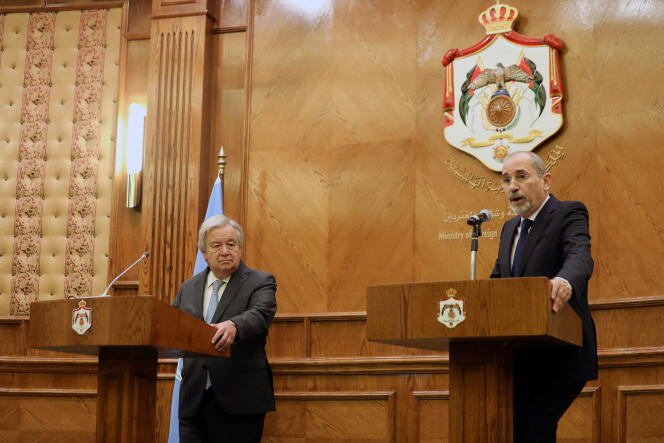
The images of Iranian drones being intercepted in Jordan's airspace on Saturday, April 13, have rekindled accusations of collusion with Israel and its American ally, aimed at governments in the region by voices in public opinion, which have already been embittered by their leaders' perceived lukewarm support for the Palestinians. Unlike Jordan, which has acknowledged its intervention, the Gulf powers have remained on the sidelines. But they are nonetheless being singled out for blame, if only because they host American military bases that are used for surveillance purposes.
The idea that an unprecedented united front to defend Israel has been formed around the military coalition led by Washington, London and Paris – with the support of Arab partners who are Tehran's rivals – has been supported by Israeli officials, who have not, however, disclosed a list. Israeli Defense Minister Yoav Gallant on Sunday emphasized the opportunity to form "a strategic alliance" with these Arab partner states, similar to the anti-Iran coalition that underpinned the normalization of relations between Israel and four of the countries in the region, such as the United Arab Emirates, under the Abraham Accords in 2020.
These agreements, promoted by Washington under former president Donald Trump, were part of American efforts to forge a regional alliance between Israel and other countries in the area. Another component was the integration of Israel into the American military's Central Command (CENTCOM) – its Middle East command, to which Arab countries such as Jordan and Saudi Arabia also contribute. CENTCOM commander General Michael Erik Kurilla had traveled to Israel ahead of the Iranian attack to coordinate military strategy in advance.
"The Israelis are delighted. They were able to test the level of collaboration and cooperation of certain countries, such as Jordan and even Saudi Arabia, which sought to protect itself," commented Hasni Abidi, director of the Center for Studies and Research on the Arab and Mediterranean World (CERMAM). Most Arab states have continued to proclaim their neutrality, having been paralyzed by the threat of a regional conflagration since the start of the war between Israel and Hamas in the Gaza Strip in October 2023, as well as by fronts of support for the Palestinian movement being opened up all across the "axis of resistance" led by Iran – Lebanon's Hezbollah, Iraq's Shiite militias and Yemen's Houthi rebels.
Fears of Jordan being destabilized
However, the escalating conflict between Iran and Israel has put regional security back at the top of their agenda, and with it the imperative need to seek shelter under the American security umbrella. At this stage, only Jordan has demonstrated its alignment with American strategy. The Hashemite kingdom's security depends on financial support from Washington, which stations hundreds of troops on its soil. The United States has accelerated deployment to Jordan of Patriot air defense systems, which had been requested by Amman in January to secure its borders after a drone attack carried out by Iraqi militias. The attack, against a position on the border with Syria, had killed three American servicemen.
You have 51.97% of this article left to read. The rest is for subscribers only.